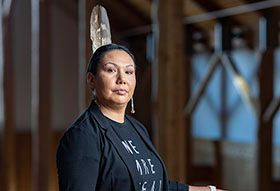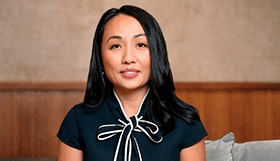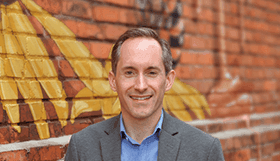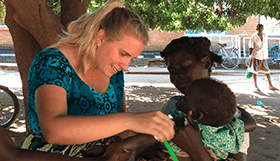2008 Forward under 40 Award Honoree
UW Major: Natural science, environmental studies
Age: 35 | Edgar, Wisconsin
Associate Principal, Lincoln High School, Edgar, WI
Ryan Christianson has a knack for forging school-community partnerships.
As a Wisconsin high school biology teacher, he and a colleague collaborated with the North Lakeland Discovery Center in Manitowish Waters to create Digital Time Travelers, a program that integrates the study of state cultural and natural resources. Students studied centuries-old journals and maps and explored historic canoe routes and portages, and then shared their research by creating Web pages and digital videos. Wisconsin Public Television featured the program as a model for educators and continues to feature it on Discover Wisconsin: Into the Outdoors.
Christianson's innovative ideas have benefited adult learners as well. His popular public gardening workshops were an offshoot of his prairie restoration project at the high school that attracted community interest and support. He helped recreate the 6-Pause Portage, the most traveled portage route in north central Wisconsin for Native Americans and fur traders, for the Mercer Historical Society, reclaiming a historic resource that had been lost for more than 150 years.
The Wisconsin teachers ability to build partnerships helped him secure a grant from the Wisconsin Advanced Telecommunications Foundation to preserve the cultural and natural resources of the northwoods. Christianson recruited a consortium of veterans, historians, scientists and Native Americans to work with high school students to collect data from an endangered watershed, record oral histories of World War II veterans, digitize local historical artifacts and contribute to Ojibwe language preservation efforts.
Now a high school administrator in Wisconsin Rapids, Christianson remembers his years at UW-Madison as challenging, often nudging him outside his comfort zone to learn more about himself and what he was capable of doing. Though hes honored to receive a Forward Under Forty award, he says being a UW grad is an honor and accomplishment all by itself.
In his own words
Some leave college ready, prepared, and motivated to take on the world. Others set out inspired to join, be a part of, and make a difference in the world. My experience at the University of Wisconsin instilled a lasting impression on the development of my self-identity and, ultimately, has directed me down the road to becoming a better, more complete person. Simply stated, my UW experience has impacted my life by making me want to do more and be more.
However well-prepared or blessed with natural ability, I was pushed outside of my comfort zone at the University of Wisconsin. I am not too proud to admit that I was truly challenged, as a student, during my days in Madison. Having been pushed outside of my comfort zone, I learned a lot about myself, as a student and as a person who I really was, what I was capable of doing, and, most importantly, where I needed to improve. By being challenged, I developed a new and expanded understanding of my abilities and found myself able to achieve at new levels of personal and academic accomplishment in the process.
Through my experience at the UW and insights as an educator working with youngsters, I have come to believe passionately in the value and significance of reaping the rewards of taking academic risks. As a former teacher and current school administrator, I advocate for Advanced Placement (AP) programming for high school students as what I sometimes call an academic character building experience. The rigor of this coursework serves as an effective determinate for students as to the extent to which they are academically prepared for college success while showcasing, through AP exams, what they can really do on a global academic continuum. I extend this message by serving as a workshop consultant for the College Board, facilitating AP workshops for school administrators around the country on the topic of growing an AP program. I also promote my advocacy by serving on the Wisconsin AP Advisory Council. As with my experience at the UW, students subscribe to meaningful challenges and, when pressed to produce, will often summon a new level of empowerment allowing them to achieve and exceed their academic goals.
While I believe I have always been a naturally curious individual, my UW experience deepened my hunger for exploration and discovery. This has revealed itself in my professional life through the pursuit of original and innovative instructional models. In particular, I have focused my energy on providing students with authentic research projects that exercise their critical thinking and problem-solving skills.
Beginning in 1999, a colleague and I began a program called Digital Time Travelers. Digital Time Travelers is an interdisciplinary experience that integrates the study of cultural and natural resources. We developed and offered the program in conjunction with the North Lakeland Discovery Center in Manitowish Waters, Wisconsin. Students conducted authentic research by studying 18th and 19th century historic journals and maps, followed by field investigations of centuries-old canoe routes and portages. The culmination of their work was the construction of Web pages and digital video products that publish the data and analyses tabulated during their experiences. The purpose of the Web pages are to showcase student work and, ultimately, create a broad forum to promote discussion and debate and achieve new levels of understanding regarding the early cultural and natural resources of the northwoods. The accomplishments of this program were aired by the Educational Communications Board on Public TV and continue to run as a feature on Discover Wisconsin: Into the Outdoors.
Many of the most distinguished accomplishments I have been privileged to be a part of were conceived through peer collaboration. Given the distinct array of individuals I found myself surrounded by during my studies at the University of Wisconsin, I established an early understanding of the significance and importance of interaction with diverse peoples. Working and collaborating with others striving to experience success by fostering others success has become a guiding principle in my personal and professional life. Predicated on this notion, I co-authored, coordinated and managed a $185,000 grant sponsored by the Wisconsin Advanced Telecommunications Foundation during the 20002001 school year while I was teaching in Marshfield, Wisconsin. This grant made possible the creation of the Cultural and Natural Resources Telecommunications Partnership a unique consortium of students, formal and non-formal educators, historians, scientists, Native Americans, veterans and other citizens from four different communities. The activities that resulted from this grant project engaged students in authentic research and created community ties, all for the purpose of preserving cultural and natural resources. The activities that resulted from this grant project engaged students in authentic research and created community ties, all for the purpose of preserving cultural and natural resources. In addition to enhancing Digital Time Travelers activities, Marshfield High School students collected data from an endangered watershed, digitized local historical society artifacts, contributed to Ojibwe language preservation efforts, and documented oral histories from World War II veterans. This learning community model garnered dynamic partnerships, which spawned learning experiences that helped elevate awareness and promote diversity.
My UW experience taught me the importance of striving to find ways to learn from others and celebrate the diversity that comes from interacting with people of different experiences and backgrounds.
Much in the way I found meaning in my studies at the UW, people excel at learning when they feel a sense of significance. As an educator, I have actualized a sense of significance through service-oriented activities centered on the development of learning communities. These efforts have allowed me to extend my classroom practices into the community and build diverse partnerships. In Marshfield, where I taught, I utilized my background in environmental science to contribute to community activities. While establishing a prairie restoration program at our high school, interest and support from the community was contagious and inquiries about prairie gardening began to mount. I responded by facilitating an adult short course on prairie gardening through Northcentral Technical College. Upon request from the city, I later worked with Marshfield city planners as a volunteer consultant in helping plan for the incorporation of prairie plantings on the site of their new wastewater treatment facility.
The establishment of the Cultural and Natural Resource Telecommunications Partnership introduced me to the communities of Manitowish Waters, Lac Du Flambeau and Mercer. While this partnership began as a venture to engage students and educators from diverse communities, this learning community model evolved to include community learning. As an extension activity, a colleague and I contributed to the Mercer Historical Society by conducting a research study of a portage route located in their historic district. Their community hoped to expand their understanding of 6-Pause Portage. This vital historic resource had been lost for over 150 years. The culmination of our research was the production of a digital video and Internet Web site documenting the historic location and modern re-creation of 6-Pause Portage. Upon completion of the project, we conducted a series of community presentations showing the video and Web site followed by discussion sessions. Participation and support from the community in this community learning experience was compelling.
The University of Wisconsin has had an immeasurable impact on my development as a person. Truly, the UW redirected my life. My UW experience enveloped a desire in me to take on new challenges, embark upon new discoveries, and make a difference in the lives of others. I am proud of what I have been a part of and with whom I have had the privilege of working. As much as I have worked to effect a positive impact on others, I have benefited because these industrious interactions have made me a better person. This defines the journey I have been on a journey that was launched with momentum rendered from my UW experience. And, however emergent or accomplished the journey may be, I hope the best is yet to come.





